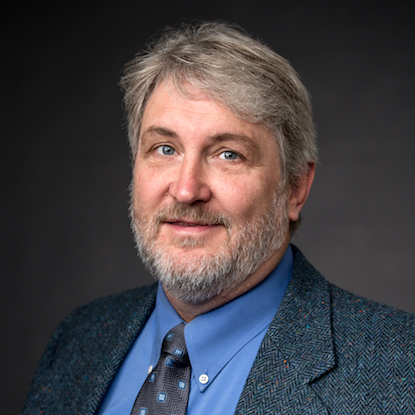Professor Calhoun’s teaching and research focus on topics in ancient Greek philosophy, human nature, the epistemology of belief and conversion, existentialism, Christianity and science, and Christianity and popular culture. In ancient philosophy, particular interests include Socratic method, Aristotelian virtue ethics, friendship, and Aristotle’s theory of human nature. Regular teaching of 91łÔąĎÍř’s Philosophy of Human Nature core course fostered has fostered interest in particular problems such as human and animal cognition, which in turn led to exploration of the historical and conceptual relationships between philosophy, Christianity, and natural science, and the implications of the Darwinian revolution in natural science for traditional concepts of human nature. Much of his recent scholarship has been in philosophy and film, especially themes of religious faith and secularism in popular film. Calhoun recently taught consecutive seminars on Kierkegaard at the graduate and undergraduate level, and capitalized on COVID shutdowns by organizing a series of virtual reading groups on key Kierkegaardian texts.
“Entranced by the Spectacle of Truth: Wonder and Ascent in Plato and Terrence Malick’s Knight of Cups and To the Wonder.” Plato and the Moving Image, ed. Michael Weinman and Shai Biderman. Cambridge: Brill, 2019. 194-209.
“Imagined Cosmologies: Nature and the Unveiling of Nature in Malick’s The Tree of Life and Kubrick’s 2001: A Space Odyssey.” Film and Philosophy 21 (2017): 113-37.
“Who Has Eyes to See, Let Him See: Terrence Malick as Natural Theologian.” Theology and the Films of Terrence Malick, ed. Christopher B. Barnett and Clark J. Elliston. Routledge, 2016. 66-98.
“From Solitary Individualism to Post-Christian Stoic Existentialism: Quests for Community, Moral Agency, and Transcendence in the Films of Clint Eastwood.” The Philosophy of Clint Eastwood, ed. Brian Clayton and Richard McClelland. University of Kentucky, 2014. 13-40.
“The Euthyphro Problem.” New Catholic Encyclopedia Supplement 2012-13: Ethics and Philosophy. Ed. Robert L. Fastiggi. 4 vols. Detroit: Gale, 2013. Vol. 2: 519-20.
“Prospects for Human Dignity before and after Darwin.” Human Dignity in Bioethics: From Worldviews to the Public Square, ed. Steven C. Dilley and Nathan J. Palpant. Routledge Annals of Bioethics. Routledge, 2012. 166-198.
"Human Exceptionalism and the Imago Dei: The Tradition of Human Dignity.” Human Dignity in Bioethics: From Worldviews to the Public Square, ed. Steven C. Dilley and Nathan J. Palpant. Routledge Annals of Bioethics. Routledge, 2012. 19-45.
“Which Socratic Method? Models of Education in Plato’s Dialogues.” Knowledge, Teaching, and Wisdom. Ed. Keith Lehrer, B. Jeannie Lum, Beverly A. Slichta and Nicholas D. Smith. Dordrecht: Kluwer Academic, 1996. 49-70.
“Can Human Beings Be Friends of God?” The Modern Schoolman 66 (1989): 209–19.
“God and Self: Ontology and Intersubjectivity.” Journal of Value Inquiry 22 (1988): 23–38.

